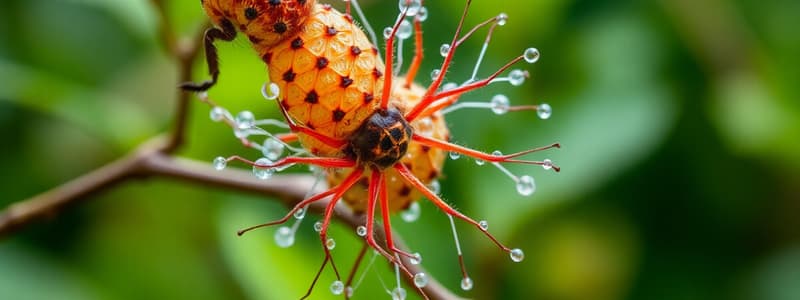Podcast
Questions and Answers
What is Biology?
What is Biology?
- The study of human behavior
- The study of living things (correct)
- The study of the universe
- The study of the Earth's atmosphere
What are some of the key characteristics of living things?
What are some of the key characteristics of living things?
- Growth, reproduction, response to stimuli
- Made of cells, require energy, maintain homeostasis
- Adapt to their environment, evolve over time, organized
- All of the above (correct)
What is the basic unit of life?
What is the basic unit of life?
- Organism
- Organ
- Tissue
- Cell (correct)
What is the process by which organisms make their own food?
What is the process by which organisms make their own food?
What is the study of how organisms interact with each other and their environment?
What is the study of how organisms interact with each other and their environment?
Flashcards
Biology
Biology
The scientific study of life and living organisms.
Cells
Cells
The basic unit of life that makes up all living organisms.
Photosynthesis
Photosynthesis
The process by which green plants use sunlight to synthesize food.
Ecosystem
Ecosystem
Signup and view all the flashcards
Genetics
Genetics
Signup and view all the flashcards
Study Notes
Introduction to Biology
- Biology is the scientific study of life, encompassing a vast range of organisms and their interactions.
- It explores the structure, function, growth, origin, evolution, and distribution of living organisms.
- Key areas within biology include biochemistry, genetics, ecology, and physiology.
- Biology utilizes scientific methods to investigate biological phenomena and test hypotheses.
Branches of Biology
- Botany: The study of plants. This includes plant structure, function, reproduction, evolution, and ecology.
- Zoology: The study of animals. This encompasses animal anatomy, physiology, behavior, evolution, and ecology.
- Microbiology: The study of microorganisms, such as bacteria, viruses, fungi, and protists.
- Ecology: The study of the interactions between organisms and their environment. This includes the impact of living organisms on each other and the physical world around them.
- Genetics: The study of genes, heredity, and variation in organisms. It encompasses the transmission of traits from one generation to the next, as well as the structure and function of genetic material.
- Physiology: The study of how living organisms function. It studies the functions of organs, organ systems, and cells in organisms.
- Biochemistry: The study of the chemical processes within and relating to living organisms. This includes the study of molecules such as proteins, carbohydrates, and lipids, and how they participate in biological reactions.
- Cell Biology: The study of cells, their structure and function, and the processes that occur within cells, like cell division and energy production.
Key Characteristics of Living Organisms
- Cellular Structure: All living things are composed of cells, the basic units of life.
- Metabolism: Living organisms carry out various chemical reactions to acquire and use energy and building blocks. This includes both catabolism (breakdown) and anabolism (synthesis).
- Reproduction: Living things reproduce to create new organisms. This can be asexual (single-parent) or sexual (two-parent).
- Growth: Living things increase in size and complexity. This can occur through cell division or other biological processes.
- Adaptation: Living organisms adapt to their environment to increase their chances of survival and reproduction. This can involve physical, behavioral, or physiological characteristics.
- Response to Stimuli: Living organisms respond to changes in their environment.
- Homeostasis: Living organisms maintain a stable internal environment, even when external conditions change.
- Evolution: Living things change over time due to inherited traits and adaptation.
Biological Levels of Organization
- Atoms: Smallest units of matter.
- Molecules: Groups of atoms bonded together.
- Organelles: Specialized structures within a cell.
- Cells: Basic unit of life.
- Tissues: Groups of cells with similar structure and function.
- Organs: Groups of tissues that work together.
- Organ Systems: Groups of organs that work together for a specific function, like the circulatory system or digestive system.
- Organism: An individual living being.
- Population: A group of organisms of the same species in a given area.
- Community: All the populations of different species in a given area.
- Ecosystem: The community of organisms and their physical environment.
- Biosphere: The global sum of all ecosystems.
Methods in Biology
- Observation: Gathering information through senses.
- Hypothesis: A testable explanation of a phenomenon.
- Experiment: A controlled test designed to validate or refute the hypothesis.
- Data Analysis: Evaluating results to determine if the hypothesis is supported.
- Conclusion: Summarizing the findings and drawing inferences from the results.
Studying That Suits You
Use AI to generate personalized quizzes and flashcards to suit your learning preferences.




